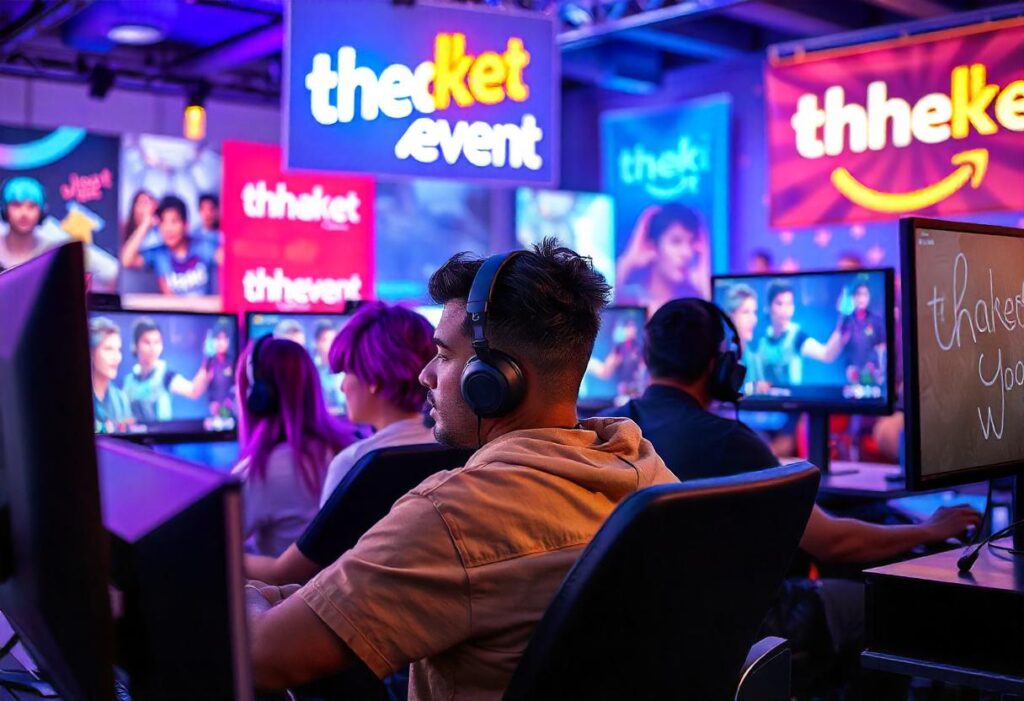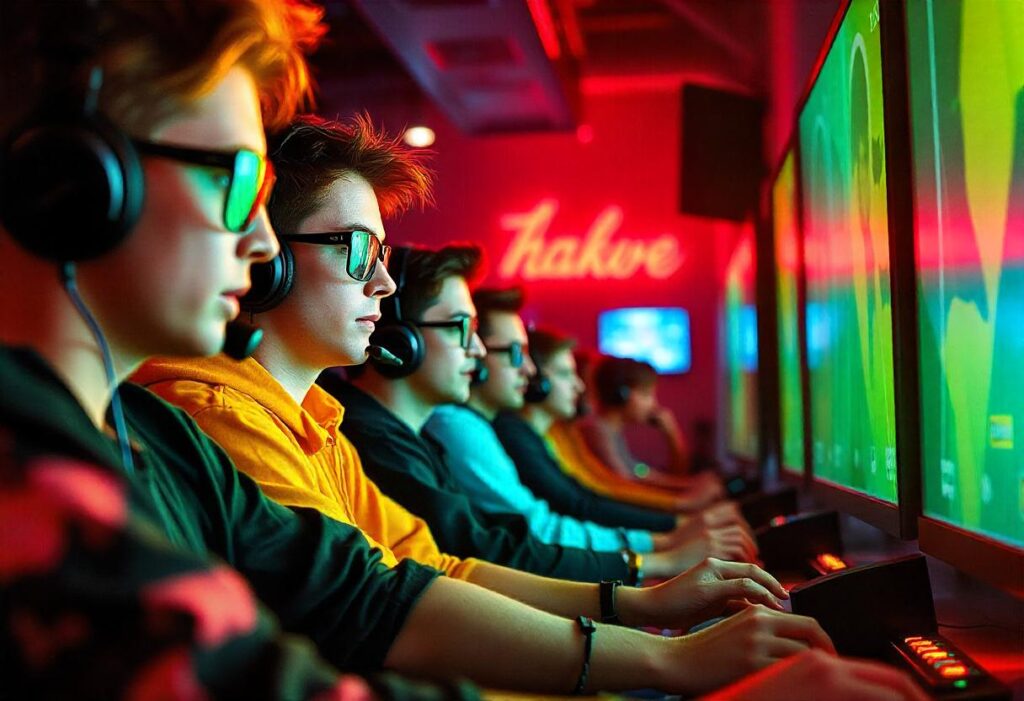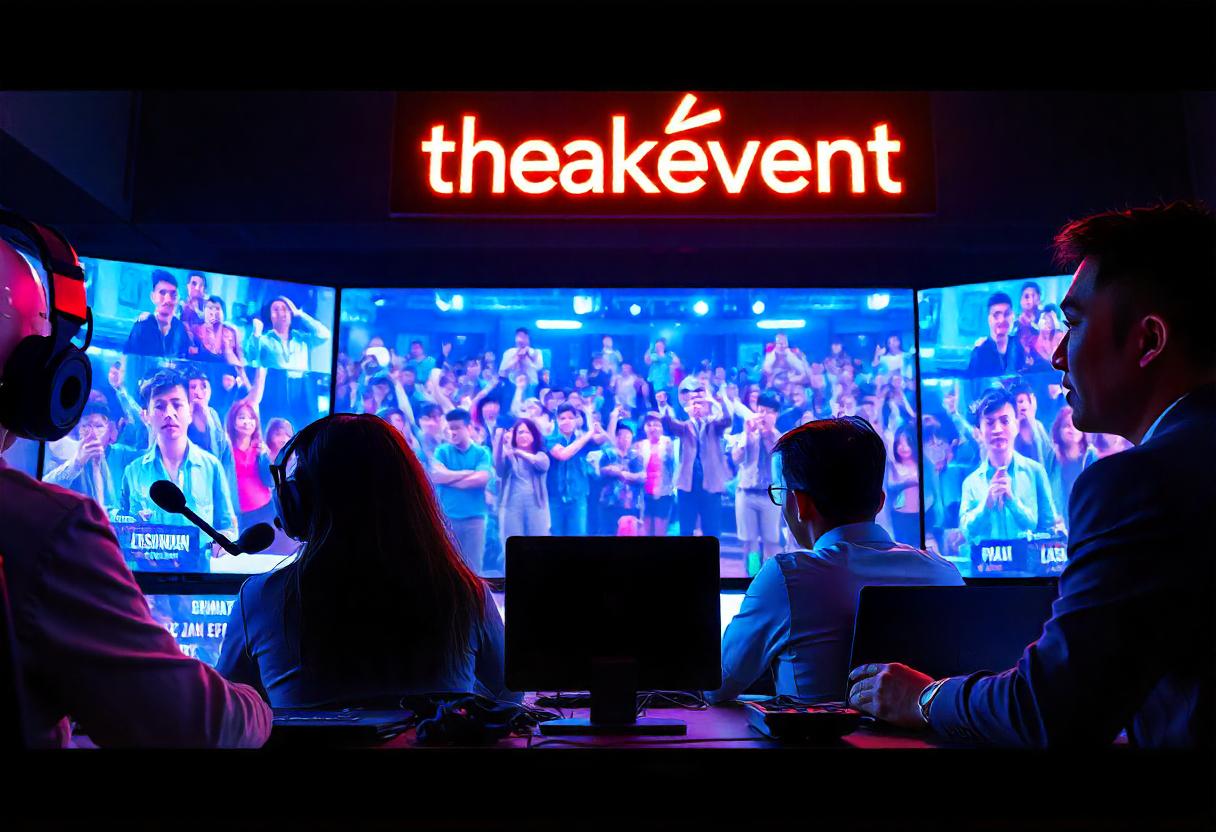Let’s dive into the electrifying world of online video gaming events, specifically focusing on how platforms like “thehakevent” (we’ll treat this as a stand-in for any similar platform) make these digital spectacles happen.
Forget stuffy technical manuals, we’re going to explore this topic how do online video gaming events work thehakevent, with the same energy and enthusiasm you’d feel during an intense esports match.
Get ready to understand the nuts and bolts of how these online gaming events work, from the initial spark to the final victory screen.
The Digital Colosseum: Understanding Online Gaming Events
Before we zoom in on the specifics of “thehakevent,” let’s establish what we mean by “online gaming events.” These are essentially organized competitions or gatherings around video games, happening entirely online.
Think of it like a sports tournament, but instead of a physical arena, it’s a digital space where players compete remotely.
These events can range from small, casual tournaments to massive esports leagues with huge prize pools and global audiences.
A Quick Refresher: What is Online Gaming?
Just to make sure we’re all on the same level playing field, let’s briefly recap what online gaming is. In essence, it’s playing video games over the internet, connecting you with other players from around the corner or across the world.
This connectivity allows for multiplayer experiences, competitive matches, and a whole lot of fun.
The Hakevent Model: A Framework for Understanding
For the purpose of this article, we’ll use “thehakevent” as a hypothetical platform, but the principles we’ll explore are applicable to most platforms hosting online gaming events.
We’ll examine how such a platform generally works, from the initial event creation to the final results and payouts.
Step 1: Event Creation and Setup
This is where the magic starts. It’s the planning phase, the blueprint for the whole operation. Here’s how it typically breaks down:
- Choosing a Game: The first crucial step is selecting the game that will be featured in the event. This decision often depends on popularity, community interest, and the specific audience the platform is trying to attract.
For example, a platform might choose a popular title like League of Legends or Counter-Strike for larger tournaments, and a more casual game like Rocket League for smaller events. - Defining Event Parameters: This involves setting up rules, format, and tournament structure. Will it be a single-elimination bracket, a round-robin, or something else entirely?
Will there be team or individual competitions? What are the specific rules of engagement? These rules have to be clear and concise so there are no issues during the event. - Setting Entry Requirements: Does the event require an entry fee? Are there specific skill levels or platform requirements? These are also set to get the most appropriate pool of players.
- Scheduling and Timelines: Setting the date, time, and duration of the event, including check-in times, game times, and breaks.
This has to be done while considering the multiple timezones involved when hosting online events, so a good planning is key. - Prize Structure and Payouts: Deciding on prize pools, how they will be distributed among winners, and methods for prize disbursement. This is a crucial step, as it is the biggest motivator for players to enter and compete.
- Platform Configuration: Setting up the event page on the “thehakevent” platform, which includes everything from event descriptions, rules, and registration forms to communication channels and bracket displays.

Step 2: Player Registration and Check-In
Once the event is created, the next step is getting the players on board.
- Registration: Players sign up for the event using the “thehakevent” platform, providing necessary information like their in-game names, contact information, and team details. The platform usually confirms the player by sending a confirmation email or a message.
- Verification and Eligibility: The platform may perform checks to ensure players meet eligibility criteria, such as skill levels, geographical restrictions, or age requirements.
- Team Formation: For team-based events, the platform facilitates team creation and management, allowing players to create their teams, invite members, and manage their rosters.
- Check-In Process: Before the event starts, players are required to check-in via the platform. This confirms their availability and ensures that only confirmed players will be able to compete.
Players are often required to provide the game client screenshots to show that they are indeed available to play at the scheduled time.
Step 3: Event Execution
This is where the rubber meets the road, where the planning meets the action.
- Matchmaking and Pairing: The “thehakevent” platform uses algorithms to pair players or teams for matches based on the tournament structure and the players registered. Usually, the platform displays the brackets to ensure the players are aware of the upcoming matchups.
- Game Server Management: For some events, the platform manages game servers, ensuring that players are placed into correct game instances.
This is crucial for ensuring all the players are playing in the same server, eliminating any external interference or problems. - Communication Channels: The platform often provides communication channels for players and admins to communicate in real time, report issues, and receive updates. Discord is the go to platform for this, but some platforms integrate their own messaging system.
- Real-Time Tracking and Updates: The platform provides real-time updates on match results, scores, and player progression throughout the event.
This usually includes some form of a “scoreboard” that tracks the results so far, and indicates the progression within the bracket for all participants and spectators. - Admin Support: Event organizers provide support to players via the platform’s admin interfaces to resolve disputes, enforce rules, and manage any unforeseen issues.
Admins monitor the games to make sure all the rules are followed, and are there to quickly respond to any issues that may occur during the matches. - Spectator Access: Many events also allow spectators to watch matches in real-time through the platform, or via integrated streaming platforms like Twitch or YouTube.
This is what allows viewership beyond just the players involved in the tournament.
Step 4: Post-Event Processing
After the last match is played, the platform handles the final steps.
- Results Confirmation: The platform verifies the results of all matches, ensuring accuracy and resolving any discrepancies.
Usually, the game client itself will provide match results for the admins to verify, before publishing the results on the platform. - Prize Distribution: Based on the final results, the platform distributes prizes to winners, following the defined prize structure.
Payment methods usually vary, but commonly include options like PayPal, direct bank transfer, or platform credits. - Event Statistics and Reporting: The platform often provides detailed statistics and reports about the event, including player performance, match details, and overall engagement metrics. This helps the organisers improve future events.
- Feedback and Reviews: The platform may collect feedback from players to improve future event experiences.
Player reviews can also be displayed to show the community the overall rating of the platform.

The Technology Behind the Scenes: Key Components
Let’s peek under the hood to understand the key technologies that enable these online gaming events.
- Web Platforms/APIs: Platforms like “thehakevent” utilize web platforms and APIs for player registration, event management, communication, and results tracking.
They must be designed to handle large amounts of traffic, especially during peak usage times. - Game Integration: The platform must integrate with game APIs to access data, manage servers, and collect real-time results from in-game events.
For example, a game like Valorant has a very open API for third party platforms to utilise for these type of features. - Real-Time Communication Systems: Integrated chat systems, voice chat servers, and notification systems enable real-time communication between players, admins, and spectators. For a platform like “thehakevent” this is crucial for the event to be smooth.
- Payment Gateways: Secure payment gateways are integrated for handling entry fees, prize distribution, and other financial transactions.
This is crucial for making sure the players get their prize money on time. - Database Management: A robust database system is required to store and manage player information, event details, match results, and other relevant data. This must be optimized to handle the data from all the concurrent users playing.
- Cloud Infrastructure: Most platforms use cloud infrastructure to scale their servers, handle high traffic, and ensure reliable performance.
- Live Streaming Integrations: Platforms usually integrate directly with streaming platforms, allowing for easy streaming setup for all participants involved in the event.
Different Types of Online Gaming Events
Online gaming events are not monolithic. They come in many shapes and sizes. Let’s look at some of the common types:
- Casual Tournaments: These are smaller events that are generally focused on fun and community engagement, often with minimal or no prize pools.
This may be organised within a community, or just a fun event to let the players compete with each other without too much at stake. - Competitive Tournaments: These are more serious competitions with larger prize pools, drawing in skilled players looking to test their abilities.
These are also usually organized with a lot more planning, often with multiple layers, such as qualifiers to get into the main event. - Leagues: Organized series of competitions that span over a period of time, usually weeks or months, offering a consistent schedule for competitive gaming. These leagues are often held once or twice a year and have a huge amount of prestige attached to them.
- Festivals: Large-scale events that combine gaming competitions with other attractions, such as live music, cosplay contests, and vendor showcases.
These festivals are more about the overall community celebration, and they feature a variety of different events for the various types of gamers, allowing for a broader audience. - Charity Events: Tournaments organized to raise money for charitable causes, often engaging popular streamers and gaming personalities to attract donations.
These type of events are usually a bit more relaxed and informal, often favouring community engagement over serious competition. - Esports Events: These are professional level competitions, with the best players competing, typically with huge prize pools and large viewerships.
These type of events are usually the top tier events in a games ecosystem and attract a large amount of attention from all corners of the gaming community.
Case Studies: Real-World Examples of Online Gaming Events
To better understand how these events work in practice, let’s take a look at some case studies.
Case Study 1: Community Tournament on “thehakevent”
- Game: Rocket League (Casual Tournament)
- Event Type: 3v3 Tournament
- Number of Teams: 32 Teams
- Platform Features Used: Registration system, matchmaking, chat system, admin support.
- Key Highlights:
- The event was a fun, casual tournament open to all skill levels
- “Thehakevent” provided a simple platform for team registration and matchmaking
- Admins were available to resolve any disputes
- The platform streamed the finals on Twitch
Case Study 2: Competitive League on “thehakevent”
- Game: Counter-Strike: Global Offensive (Competitive League)
- Event Type: Team-based League
- Number of Teams: 16 Professional Teams
- Platform Features Used: Player verification, match scheduling, league standings, result tracking, live streaming.
- Key Highlights:
- The event was a professional league with a large prize pool.
- “Thehakevent” platform integrated with a stream to manage a live viewing experience.
- The platform offered detailed statistics and reports for player and team performance.
- Admins worked diligently to keep a consistent schedule.
Case Study 3: Charity Event on “thehakevent”
- Game: Minecraft (Charity Event)
- Event Type: Builder Competition
- Number of Participants: 100 Individuals
- Platform Features Used: Registration, donation integration, real-time build display, admin support, live streaming.
- Key Highlights:
- The event was a charity stream that raised funds for a local children’s hospital.
- “Thehakevent” facilitated a builder competition that was streamed live for the public.
- The platform integrated with a charity donation system, encouraging viewer participation.
- Community engagement was a key component of the event.
The Challenges of Online Gaming Events
Organizing online gaming events is not without its challenges. Let’s look at some of the common hurdles:
- Technical Issues: Server crashes, network glitches, and software bugs can disrupt the event. A platform has to have fail-safes in place to prevent these type of problems.
- Cheating and Fair Play: Dealing with hackers, cheaters, and unsportsmanlike conduct is a constant challenge. Good anti-cheat mechanisms need to be in place.
- Time Zone Conflicts: Managing events that involve players from different time zones requires careful scheduling and planning.
- Scaling and Load Balancing: Handling a large number of players and spectators simultaneously can strain platform resources, especially during peak event times.
- Maintaining Engagement: Keeping players and spectators engaged throughout the duration of an event can be difficult.
- Payment and Payout Issues: Ensuring smooth and timely prize payouts is a critical element.
- Community Management: Managing player behaviour and resolving conflicts requires skilled community management teams.
The Future of Online Gaming Events
The future of online gaming events is bright, with exciting trends and developments on the horizon. Here are a few areas we are likely to see progress in:
- Enhanced Spectator Experience: Improved streaming technologies, interactive overlays, and virtual reality (VR) viewing options could offer more engaging experiences for viewers.
- More Sophisticated AI Tools: AI-powered tools could streamline event management, automate matchmaking, detect cheating, and provide personalized recommendations.
- Integration with the Metaverse: Online gaming events are likely to find a place in the metaverse, creating richer and more immersive virtual experiences.
- Increased Mobile Gaming Events: As mobile gaming grows, we are likely to see more large-scale events on mobile platforms.
- Expansion of Accessibility: Developers are creating more opportunities for people with disabilities to participate in gaming events, focusing on inclusivity.
- NFTs and Digital Assets: We are also likely to see an increase in the utilisation of NFTs and digital assets as part of prize distribution, and player reward systems.
Conclusion: The Evolving Landscape of Digital Competition
Online gaming events, facilitated by platforms like “thehakevent,” have revolutionized how we interact with video games.
They offer opportunities for casual fun, intense competition, community engagement, and much more. While there are challenges to overcome, the technologies and platforms are constantly evolving, making the world of online gaming events more engaging, accessible, and dynamic.
The digital colosseum is open and anyone can join. So whether you are a competitive player, a casual fan, or just curious, the world of online gaming events has something for everyone. The most important thing to remember is to have fun with it!
You will find this article very informative about how to play prime games online.

